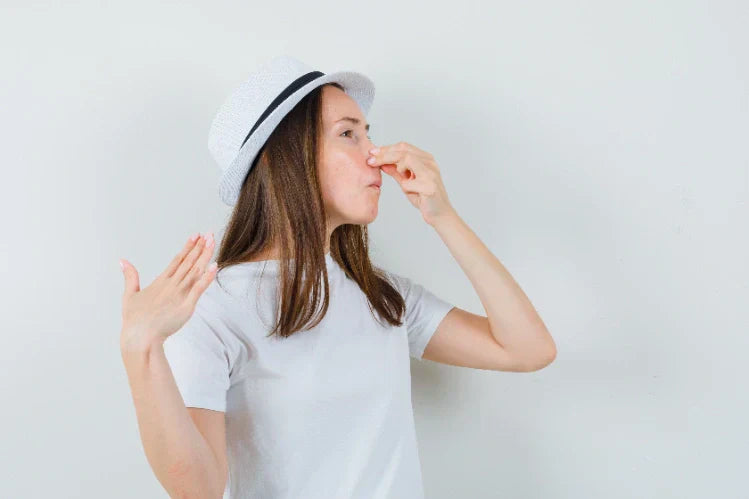
Wearing a retainer is crucial in preserving the results of orthodontic treatment, but let’s be honest, sometimes, your retainer can smell bad, and that unpleasant odor can make wearing it a little difficult. If you've ever asked yourself, "Why does my retainer smell bad even though I clean it?", you're not alone.
Just like your teeth, retainers need proper care. In this blog, we’ll explore the causes of retainer odor, effective retainer hygiene tips, and the best way to disinfect a retainer to keep it fresh and safe for daily use.
Why Does My Retainer Smell Bad?
The bad smell from retainer is usually caused by bacterial buildup. Common causes of retainer odor include:
- Bacterial Growth: Bacteria accumulate on your retainer's surface and produce microscopic organisms that thrive in the warm, moist environment of your mouth, which leads to smelly retainers.
- Food Particles and Plaque: Your retainer can trap food particles, which cause bad smells and plaque buildup.
- Dry Mouth: The shortage of saliva creates an ideal setting for microbes to thrive.
- Improper Storage: Keeping your retainer in a damp or airtight container can lead to mold and mildew.
- Infrequent cleaning: Skipping daily cleaning lets bacteria multiply, leading to a bad odor.
Retainer Hygiene Tips to Prevent Odor
Preventing odor starts with building a solid hygiene routine. Here are practical retainer hygiene tips to follow daily:
- Rinse your retainer after every removal
- Gently brush your retainer with a soft toothbrush using lukewarm water and mild soap.
- Avoid heat or hot water. That can warp your retainer.
- Keep your retainer in a ventilated case when not in use to avoid moisture buildup.
- Before wearing your retainer, brush and floss to reduce bacterial transfer.
By incorporating these simple habits, you will greatly reduce the risk of developing a bad smell from retainer.
How to Clean a Smelly Retainer
Wondering exactly how to clean a smelly retainer? Here's a step-by-step process that works well for most types.
Daily Cleaning
- Rinse with lukewarm water after removal.
- Brush gently using a soft brush and mild dish soap.
- Let it air dry before putting it back in the case.
Deep Cleaning (2–3 times a week)
- Use retainer cleaning tablets or a mixture of equal parts white vinegar and water to soak for 15-20 minutes.
- Rinse thoroughly afterward to remove any residual taste or odor.
- You can also use a cleaning solution like that offered by Aligner32 to eliminate all the germs and bacteria from your retainer.
Avoid harsh chemicals, bleach, or alcohol-based products. These can degrade the material and may be unsafe for oral use.
Retainer Smells Even after Cleaning
If your retainer smells even after cleaning, it may be due to deeper bacterial or fungal buildup. Some common mistakes include the following:
- Once a day isn’t always enough; you need a proper cleaning routine.
- Water alone doesn’t disinfect or remove bacteria effectively. You need a special cleaning solution like that offered by Aligner32 to get rid of the bacteria.
- If you store your retainer while it is wet, the moisture of the retainer encourages bacterial growth, especially in closed containers.
- If your retainer is over a year old and still smells despite cleaning, it may be time for a replacement. You can get a new one online from brands like Aligner32.
Best Way to Disinfect a Retainer and Keep It Fresh

Cleaning removes debris, but disinfecting your retainer goes a step further by eliminating bacteria and odor-causing microbes.
- Use a retainer cleaning tablet in lukewarm water for 15–20 minutes.
- Try an ultrasonic cleaner. These devices use sound waves to remove debris from hard-to-reach areas.
- Use a natural solution: Soak in a 1:1 mix of hydrogen peroxide and water once a week for a deeper clean (avoid overuse as it may affect the retainer material).
Disinfection should be done at least twice a week to maintain freshness and ensure oral safety.
Keep Your Retainers Odor-Free
If you’re dealing with a bad smell from your retainer, it’s likely due to poor hygiene, bacterial buildup, or cleaning mistakes. The good news is you can fix it with a consistent cleaning routine, proper disinfection, and by following the right care practices.
Aligner32 retainers are designed from non-toxic materials with comfort and durability in mind. They also offer a care kit that will take care of your retainers so that you can enjoy a tension-free smile journey. So the next time you wonder, “Why does my retainer smell bad?”, remember, it’s not just about wearing it but caring for it, too.
FAQs
1. How to remove bad smell from a retainer?
To eliminate bad smells, soak your retainer in a 1:1 mix of warm water and white vinegar for 15–20 minutes. You can also use a cleaning solution to clean your retainer.
2. Should I wear my retainer if it smells bad?
No, you should not wear your retainer if it smells bad. Instead, you should immediately deep clean it. If the smell persists, replace it with the new one.
Citations:
Marcin, A. (2019c, March 8). How to clean each type of retainer. Healthline. https://www.healthline.com/health/dental-and-oral-health/how-to-clean-retainers
8 tips for cleaning a retainer. (2024b, January 24). https://www.medicalnewstoday.com/articles/317894
Leber, C. (2025a, June 13). How to clean retainers: AAO’s guide to retainer care. American Association of Orthodontists. https://aaoinfo.org/whats-trending/how-to-clean-your-retainer/




